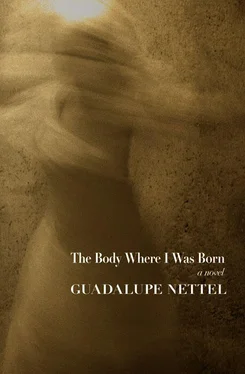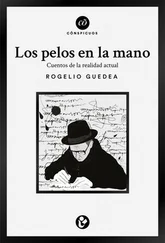After Ximena’s death, the presence of insects became much more frequent and commonplace, but no longer scared me. I had learned there were things much more terrifying than those diminutive little animals, venomous as they could be. I should also say that the insects were no longer as poisonous. Instead of burning bugs and tarantulas, I saw earthworms, beetles, and cockroaches. In my visions, the last in particular showed me friendliness, even kindness. Unlike other insects, cockroaches didn’t look at me with aggressive or challenging eyes, but the opposite; they seemed to be there to keep the other critters from coming to bother me. That’s why, whenever I found one in my room, instead of the usual nervousness, a mysterious calm would come over me.
Except for my grandmother’s mess, the apartment remained exactly as my mother had left it. Many of her clothes were still in the closet, like the old gray robe she almost always wore at home. We called it “the skin.” Her desk was the same, her pencils still sharp. Her library stood unmoved, including the I Ching . Everything gave the impression that she had only left for the weekend and at any moment would return to her regular life. Maybe we would have missed her less if we’d moved to a completely different place in which she had never set foot, where at least there wouldn’t be a trace of her to find. During the few times I was left alone in the house, I carefully went through her belongings, as if searching for an encrypted message that could tell me the exact date of her return and give me some sign that she definitely was coming back. And that was how, looking through her books and at pieces of paper slipped between their pages, I came upon a book whose title immediately caught my attention. It was a novella by Gabriel García Márquez, The Incredible and Sad Tale of Innocent Eréndira and Her Heartless Grandmother. It was a Saturday morning. My grandmother had taken my brother to the mall near the house. I opened the book and began to read voraciously. Since my mother had left, I had set aside many of the things I liked to do. I didn’t even slide down the service staircase to refresh my body and mind when it was hot out anymore. In those months I read very little and wrote nothing at all. Books made my grandmother suspicious. She knew that in her daughter’s library there were some rather uncivilized works, such as those that explained new ways to approach sex. She didn’t like to see me in the study and every time she caught me prowling the shelves she complained.
“I don’t know why your mother left all those books there, where you and your brother can get to them. She should have put them away. It wouldn’t be a bad idea to sell them by the pound,” said the woman who stored magazines from the 1930s in the bedrooms of her house.
I didn’t want my grandmother to sell my mother’s books to a second-hand dealer, so even though it meant denying myself them, I preferred to pretend they didn’t interest me. But the morning I found that novel I wasn’t ready to give it up and I read — I read as much as I could while she was gone, and when she came back I kept reading in the bathroom and in secret under the sheets once the door to my room was closed. The pages told the story of a girl, barely older than I was, enslaved by her pimp grandmother and determined to get away. Eréndira tried everything — from shooting the old women in the head to killing her slowly with rat poison — but her grandmother survived every weapon. On top of that, the book spoke of love, politics, eroticism. In short, it was exactly the kind of book my grandmother did not want to see in my hands, and this transgression made it particularly appetizing. Doctor, this discovery, as exaggerated as it sounds, was like meeting a guardian angel, or at least a friend I could trust, which was, in those days, equally unlikely. The book understood me better than anyone in the world and, if that was not enough, made it possible for me to speak about things that were hard to admit to myself, like the undeniable urge to kill someone in my family.
This was also when I met a boy, a little older than me, who was the brother of a team member and who could make me nervous with his mere presence. His name was Oscar Soldevila and he lived in Building Six. I don’t remember that much about him. I know he had longish limp hair and bangs falling over one of his eyes like a pirate. I can’t say if he really was handsome or if my perception is owed to the large amount of hormones that, unbeknownst to me, were staging a revolution inside my body. It wasn’t the first time I liked a boy, but it was the first time this feeling came with such a production of estrogen. While he played well, soccer wasn’t Oscar’s main interest. I knew that he liked to read and that, unlike me, he liked to hang out with older kids and not with his little brother’s friends. It’s not that I found older kids boring or uninteresting. I think it was just the opposite: I thought they were so interesting I was convinced I could never be their friend. What I remember most about Oscar is the sense of euphoria that came over me when he was close. I’m sure this feeling was mutual, at least for a while, because every time he played with us and scored a goal I was the one he hugged in celebration. And there was the afternoon we both hid in the same spot while playing hide-and-seek with the others. For a few minutes, I listened to his uneasy breathing with mine, as if he had run up all the floors in the building. I wanted something to happen but I didn’t know what, exactly. And of course nothing did happen. I went home and opened my mother’s I Ching to a random page, like she did during the height of her obsession, to find out what I could divine. I’ll never forget the phrase I read that day because it described exactly what was going on: “Within, all moves; without, nothing moves. It is not advisable to cross the great water.” The glory days of our relationship lasted about three weeks, in which we got to talk together and tell each other in broad strokes who we were. We saw each other by chance encounters. He never invited me out, didn’t ask for my number. But at that age, I didn’t even imagine those were the customs. One afternoon, giddy with the intensity of this previously unknown emotion — like an intoxicating substance circling through every inch of my insides, filling me with a kind of painful bliss — I took a red marker and wrote his name on an index card. Despite the obvious interest he showed in me, I had convinced myself that he could never like me. When I look at photos from that time, I see a thin, gangly girl with a pretty face. Someone rather attractive, and yet what I saw in the mirror back then was something similar to the caterpillar found dead in my shoe. A slimy and repulsive creature. Sometimes I think that initiating my love life with so little self-love was a bad omen and determined the way in which I would interact with the opposite sex in the years to come. After finding ourselves together almost every day for some time, Oscar stopped showing up as often. It’s not that he suddenly stopped seeing me, it’s just that he spent less time with me. I soon realized that he had a new friend, Marcela Fuentes, a girl older than we were, a little plump, and much shorter than me, but also much less shy. Every afternoon she’d go to the window of her apartment in the building across the way, right next to Ximena’s, and whistle, her hands cupped into the shape of an ocarina. The sound she made was strong enough to cover a fairly wide field. Oscar would respond from his own window, and for a while they would signal to each other like that. I confess I secretly practiced that whistle until I could do it exactly as they did. Sometimes I was even able to sound it from my window, hidden behind the curtains of my bedroom.
Читать дальше












